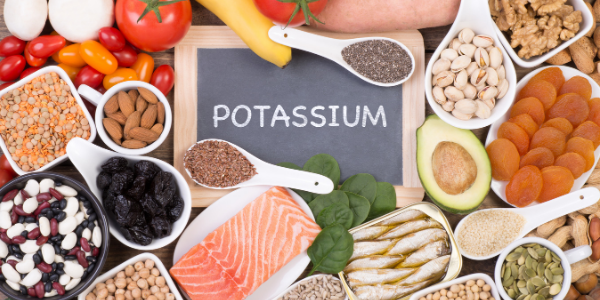Read on to learn about the ins and outs of potassium, how to incorporate it into your diet and how to use it to your advantage to improve your health.
Taking care of your health is more important than ever, but it can also feel overwhelming. Looking at an aisle full of vitamins and supplements can be intimidating, but much of it can be broken down into smaller bite-sized pieces of information to help you feel safe and confident in the steps you are taking to improve your health
Potassium Impact on Overall Health
Potassium is one of the main minerals your body needs in order to thrive. It can play a vital role in things like heart health and bone strength. Your heart is a collection of muscles and tissue that are all pretty important. Potassium helps in the contraction of those muscles, also known as your heart rate, and having too little or too much of this mineral can have negative effects on your heart rate. This triggers a chain reaction of other systems and can lead to more serious problems, such as stroke.
In terms of bone health, potassium is one of the checks and balances that helps regulate calcium levels in the body. Calcium helps strengthen bones and prevents conditions like osteoporosis from occurring. Potassium helps your bones hold on to the calcium that you have in your body and prevent you from losing bone density. Not only does this help provide stability for us as we age, but it also gives us added protection in the event of a fall because stronger bones are less likely to fracture or break.
 Needs as We Age
Needs as We Age
Now that you know a little more about how potassium can benefit you, let’s turn the focus to how we can maintain it in our bodies as we age. All of our lifestyle choices eventually end up impacting our health. If we are facing conditions like chronic kidney disease or diabetes, this can impact the flow of our blood through our bodies. A slower blood flow leads to a lessened excretion of potassium, meaning it is left to build up in our bodies. In the case of kidney disease, our bodies are not able to filter out the potassium. This can worsen with dehydration. When your potassium levels become out of balance, it can swiftly lead to more serious conditions that will affect your heart. This is why it’s important to talk to your doctor about what your levels are and how you can improve them.
Dietary Sources of Potassium
One of the most commonly known sources of potassium is bananas. While this can be an easy and inexpensive food source, you don’t have to bore yourself eating the same thing every day to maintain your levels. For reference, a medium banana contains about 425mg of potassium. One medium baked potato can contain upwards of 900mg and sweet potato contains approximately 450mg. Other foods to think about are tomatoes and oranges. Lastly, if dietary changes are not keeping your potassium level in check, your doctor may suggest different medications to help your body.
Conclusion
As you can see, there is a wide range of how this important mineral can benefit us as we age. We are able to improve our heart health and keep strong and healthy bones just by being a little more intentional about the foods we eat.





